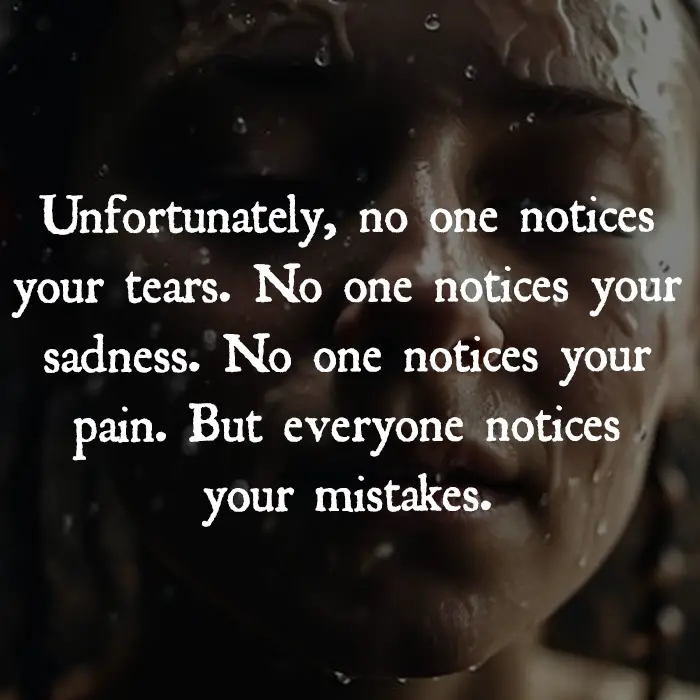
**Understanding the Quote: “Unfortunately, no one notices your tears. No one notices your sadness. No one notices your pain. But everyone notices your mistakes.”
This quote expresses a harsh reality about human nature and society. It suggests that when people suffer emotionally, their struggles often go unnoticed. However, when they make mistakes, others are quick to judge and criticize. This idea resonates with many because it reflects the way the world often works. People tend to overlook silent pain but focus on visible errors. Let’s explore the deeper meaning of this quote and how it connects to human emotions, societal behavior, and psychology.
The Loneliness of Pain and Suffering
When people are sad or in pain, they may not always express it outwardly. Many individuals suffer in silence, dealing with their emotions alone. The quote highlights that people may cry, feel hurt, or struggle internally, but others around them may not notice or care. This is because sadness is often an internal experience, and unless someone openly shares their emotions, others may not be aware of it.
A related quote by Washington Irving supports this idea: “There is a sacredness in tears. They are not the mark of weakness, but of power. They speak more eloquently than ten thousand tongues. They are the messengers of overwhelming grief, of deep contrition, and of unspeakable love.” This means that tears have deep meaning, but because they are often shed in private, people may not recognize their significance.
Why Do People Overlook Sadness?
One reason why people may not notice someone’s sadness is that everyone is busy with their own lives. Many individuals are preoccupied with their struggles and fail to see what others are going through. Society often values strength and resilience, which leads many people to hide their pain. As a result, others assume that everything is fine, even when it is not.
Moreover, there is a common belief that showing sadness is a sign of weakness. This makes some people hesitant to talk about their emotions, which further contributes to the idea that sadness goes unnoticed.
The Harsh Reality of Judgment and Criticism
While sadness and pain often go unnoticed, mistakes do not. When a person makes a mistake, people tend to remember and focus on it. Society is quick to judge others based on their failures rather than their struggles. This happens because mistakes are often visible and affect others, making them harder to ignore.
A similar quote by Winston Churchill explains this well: “Criticism may not be agreeable, but it is necessary. It fulfills the same function as pain in the human body. It calls attention to an unhealthy state of things.” This suggests that criticism exists to highlight mistakes, but it often overshadows the struggles and emotions behind them.
Why Do People Notice Mistakes More Than Pain?
- Mistakes Affect Others – When a person makes a mistake, it can have consequences that impact other people. This makes it more noticeable than someone’s private pain.
- Societal Expectations – Society often expects perfection. When someone fails, people tend to highlight their flaws instead of offering support.
- Fear of Failure – Many people project their insecurities onto others. They criticize mistakes because they fear making the same ones.
The Need for Empathy
This quote teaches an important lesson about empathy. Instead of only noticing people’s mistakes, we should also pay attention to their pain and struggles. Being kind and understanding can make a big difference in someone’s life. If we focus only on criticizing errors, we miss the chance to support and uplift others.
A quote by Mother Teresa beautifully illustrates this point: “If you judge people, you have no time to love them.” Instead of being quick to judge someone’s mistakes, we should take the time to understand their emotions and struggles.
Final Thoughts
The quote reminds us that life can be unfair. Pain often goes unnoticed, but mistakes are remembered and criticized. This is a reality that many face, but it also serves as a lesson. We should strive to be more compassionate and understanding. Noticing someone’s pain and offering support is far more valuable than focusing only on their failures.
In the end, kindness and empathy can change how we interact with others. Instead of only seeing mistakes, we should also recognize emotions, struggles, and the unseen battles people fight every day.
